This year I had the chance to visit Portugal, representing Plastic Oceans International as part of the launch of the Portuguese Plastics Pact. Apart from this important event, I wanted know more about other initiatives and solutions to reduce plastic contamination in Portugal.
So, I met with five Portuguese initiatives and this is his how it all went…….
Zero and Sciaena
In my first blog about the Portuguese Plastics Pact I reported about these two organizations that are doing an amazing job in Portugal. So click that link in the last sentence to learn more.
Cascais Ambiente & King Carlos Sea Museum
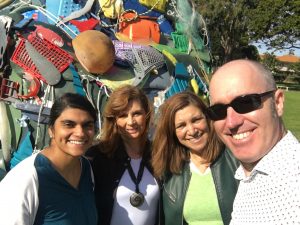
The Cascais Ambiente and museum team receiving me in front of a b0rdalo_ii original intervention in the museum garden.
My second visit was to the King Carlos Museum, in the city of Cascais, where I wanted to see Sea of Plastic, an exhibition by CIIMAR. I was received by the people from the municipality environment department and two guides from the museum who told me all about King Carlos’ passion for the ocean and ocean sciences.
Sea of Plastic
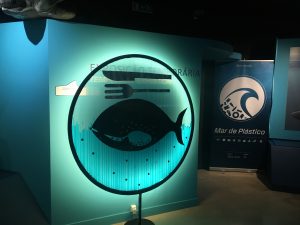
Entrance to the exhibit of ´Sea of Plastic´ exhibit in the King Carlos sea museum in Cascais.
The temporary exhibition Sea of Plastic at the museum was an interactive and educative experience with a lot of information about where plastic comes from and its negative impacts once it ends up in the environment. With interactive displays and some eye-catching installation it was very easy for children to understand what is wrong about our society’s current relationship with disposable plastics. In simple steps, the public could follow the flow of plastics, from the oil fields until it ends up on our plate.
FCT NOVA
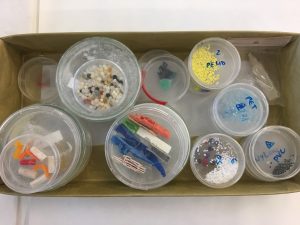
Plastic samples in petri dishes
My next visit was to the FCT NOVA University, to the science and technology faculty. There I met Marta Martins, assistant professor at the Department of Environmental Sciences and Engineering (DCEA) and some of her students, who told me more about the research they do related to plastic pollution. They have been conducting programs about microplastics in river-sediments, ingestion and excretion of them by filter feeders and much more. And not only that, they told me about how they try to communicate their science, to make sure its not just interesting for other scientists. Being part of the Plastics Pact is one way of taking science to the masses and making a difference. I was very inspired to meet a passionate teacher like Marta and a team of students who do such important work.
Plástico a Vista
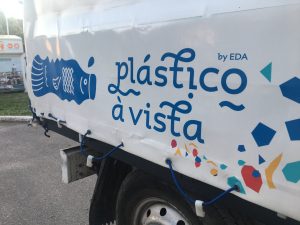
Plastico a Vista mobile workshop
My last visit in Lisbon was to meet Dolores Papa and her Plástico a Vista mobile education center. Dolores has been in touch with us for a few years now and has developed a great educational program for schools and rebuilt a van into a mobile plastic workshop. In this workshop on wheels she installed the entire Precious Plastic production line, and also all the other materials she uses to educate children in the playground and other open spaces. Dolores’ passion and drive to educate about the good, bad and ugly of plastics has been having a big impact on local schools and I hope she will be able to scale the project up in 2020 so more children can learn about plastic pollution and what solutions there are.
Lipor
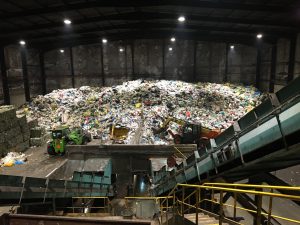
Lipor plastic sorting facility, operating 24/7
For my last visit I had to travel 200 miles by train to the city of Porto, to visit the operations of municipal waste management company Lipor. They are a public private service provider and service about 1 million households in the Porto area. One of their big milestones has been the closing of the local landfill in the early 2000s, replacing it with a waste-to-energy plant and a long lasting recycling/separation campaign. I might not agree with turning valuable resources into energy, which according to my definition of the circular economy is NOT circular at all, but burying resources in a landfill also is no option. Lipor has been increasing its recycling and composting efforts, to hopefully one day not having the need to burn waste anymore. Recently they also included the circular economy into its business model, to boost their efforts even more and educate people and other companies about all the options they have to REDUCE their waste. I was impressed with their educational program and the over 270 schools they have reached this far. I hope to be able to see their program in action in 2020 and also help them out with our international experience educating about ocean plastic pollution!
I cannot avoid mentioning their beautiful educational vegetable garden grown from the cities’ composting facility, also run by Lipor. At the moment they have 14,000 composting bins installed around town! I really want to thank them for showing me around and their willingness to collaborate to even further close the loop of waste, with partners like us.
EPR laws are not enough
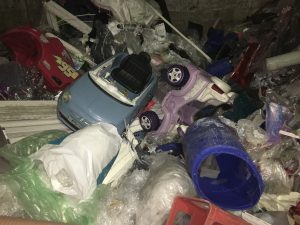
Discarted toys and other plastic items, with no possible way of recycling them.
Unfortunately, I also noticed at Lipor and during this trip, that all though in Portugal they have had an EPR (Extended Producer Responsibility) mechanism in place for many years, lots of plastic products do not qualify and have no market to be sold to and need other types of solutions. This became painfully visible in the sorting facility, where Lipor does sort all different plastics and tries to sell them somewhere in big volumes, to avoid burning them, but there is almost no market that is willing to pay for them. It was overwhelming, and left me with a clear view that having EPR schemes are necessary but there is still tons of unregulated plastic products around that at its end-of-life use. No one knows what to do with them. So even more progressive efforts are needed to really end plastic waste!
On a final note
Visiting all these amazing initiatives, who all in their own capacity and industry work to reduce plastic waste gave me hope but also homework. We have to scale up our efforts even more: educate more and better, have stricter laws and also more sanctions, we all need to work harder to make the transition to a circular economy and be tougher on companies that put plastic products in the market without a plan for what to do with them after being discarded. And last but not least….we have to collaborate, and stop trying to solve this problem on our own.
*ASIPLA annual report: http://www.asipla.cl/asipla-presento-primer-estudio-sobre-reciclaje-de-plasticos-en-chile/
PLEASE DONATE TO SUPPORT OUR EFFORTS TO END PLASTIC POLLUTION
